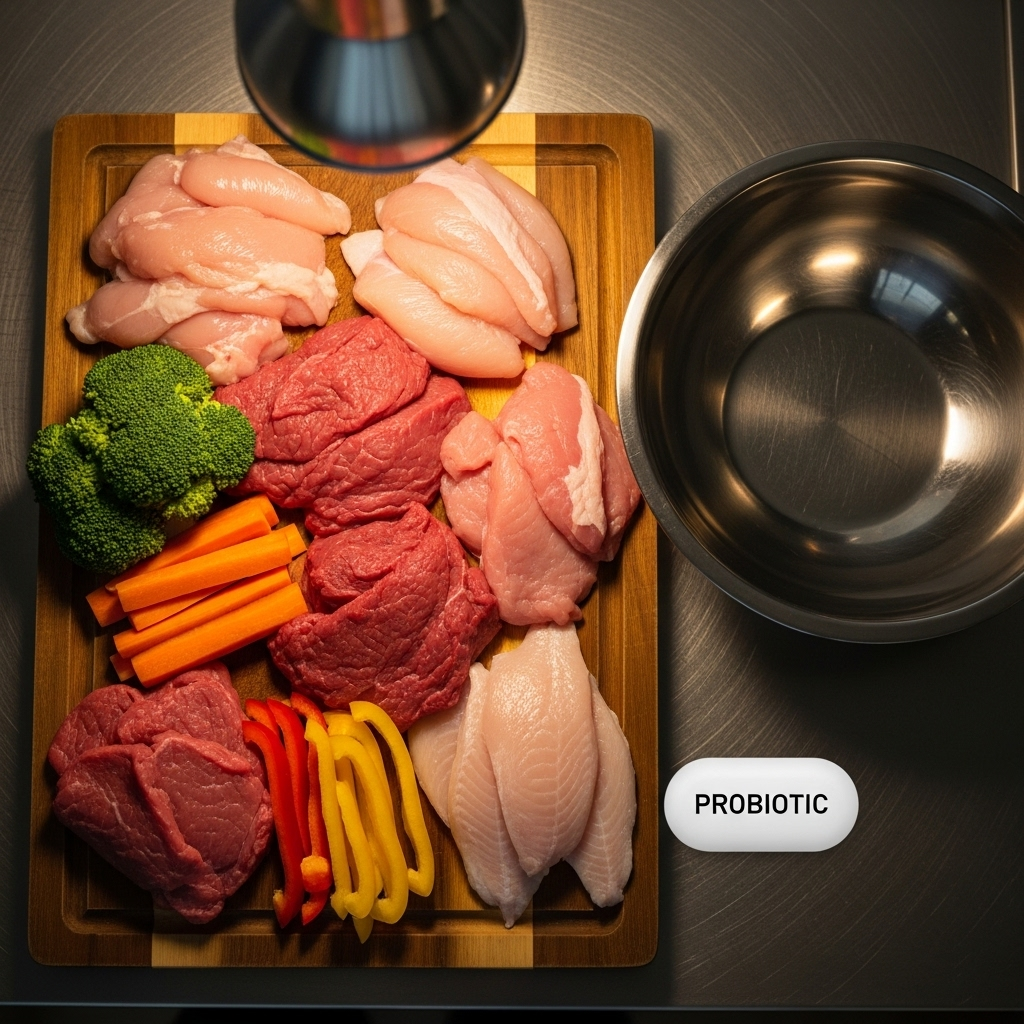Do Raw-Fed Dogs Need Probiotics?

Raw diets for dogs are popular for many owners seeking a more “natural” feeding approach. If you feed your dog a raw diet, you may wonder whether adding a probiotic supplement is necessary, helpful, or even safe. This article explains how raw feeding affects the gut microbiome, the potential benefits and risks of probiotics for raw-fed dogs, how to choose a product, and practical tips for safe use.
How raw diets affect a dog’s gut microbiome
A dog’s gut microbiome — the community of bacteria, yeasts and other microbes living in the intestines — adapts to the diet it regularly receives. Raw diets can differ from kibble in protein, fat, fiber and moisture content, and they may contain naturally occurring environmental bacteria from meat, bone and organs.
Key points:
- Raw-fed dogs commonly show different microbial profiles compared with kibble-fed dogs. These differences are not inherently good or bad; they reflect adaptation to diet.
- Raw meat can carry bacteria (for example, Salmonella or Campylobacter) that are harmless to many healthy dogs but are pathogens for humans and can sometimes cause illness in dogs.
- Some raw diets include fermented components or are prepared in ways that promote beneficial microbes; others do not.
What are probiotics and how might they help?
Probiotics are defined as live microorganisms that, when given in adequate amounts, may confer a health benefit. In dogs, probiotics are used to support digestion, reduce diarrhea during diet changes or stress, and potentially support immune function. Different strains do different things; the effects are strain-specific, not generic.
Potential benefits for raw-fed dogs
- Smoother transitions: Probiotics may reduce loose stools when switching diets or introducing new raw ingredients.
- Support for gut balance: They can help maintain or restore a healthy microbial balance after mild digestive upset or antibiotic use.
- Competitive exclusion: Some probiotic strains can help reduce colonization by certain unwanted bacteria in the gut.
Limitations and cautions
- Probiotics are not a substitute for safe food handling or for eliminating foodborne pathogens from raw meat.
- Not every dog will benefit; many healthy raw-fed dogs do well without supplements.
- Evidence varies by strain and condition — results are not guaranteed, and research in dogs is still developing.
When to consider a probiotic for a raw-fed dog
- Diarrhea or loose stools during or after switching raw diet ingredients.
- After a course of antibiotics to help re-establish normal gut flora.
- Puppies, seniors, or dogs with known digestive sensitivity — but consult your veterinarian first.
- When a specific, evidence-backed strain is recommended by your veterinarian for a condition.
Choosing a probiotic: what to look for
Not all probiotic products are created equal. When selecting a probiotic for your raw-fed dog, consider:
- Strains with evidence: Look for products that list specific strains (e.g., Enterococcus faecium, Lactobacillus acidophilus, Bifidobacterium spp., Bacillus coagulans, or Saccharomyces boulardii) and provide data or references for canine use where possible.
- CFU count: Colony-forming units (CFUs) indicate the number of live organisms. Follow manufacturer guidelines and veterinarian advice; more is not always better.
- Formulation: Refrigerated vs. shelf-stable forms have different storage needs. Choose one compatible with your lifestyle and follow storage instructions to keep microbes viable.
- Dog-specific products: Use formulations developed for dogs rather than human products unless directed by your veterinarian.
How to introduce and use probiotics safely
- Start slowly: Introduce a small amount and monitor stool consistency, appetite and energy for several days.
- Follow dosing directions: Use the product label or your veterinarian’s recommendation based on your dog’s size and health.
- Watch for adverse reactions: Rarely, probiotics can cause temporary gas, bloating or loose stools. Discontinue and consult your vet if severe reactions occur.
- Maintain hygiene: Probiotics do not eliminate the risk of foodborne pathogens. Handle raw food with human food safety precautions (clean surfaces, wash hands).
Pros and Cons
| Pros | Cons |
|---|---|
| May reduce diarrhea during diet changes or stress | Not a cure-all; benefits are strain- and dog-specific |
| Can help restore gut flora after antibiotics | Some products have weak quality control or poor labeling |
| Support for sensitive or young dogs (when recommended) | Doesn’t replace safe handling of raw food or veterinary care |
Practical tips for raw feeders
- Keep a feeding log when you start a probiotic (start date, product, dose, stool changes) so you can assess benefit.
- If you feed fermented raw items (e.g., fermented tripe), be aware they may already contribute live cultures; adding a supplement may not be necessary.
- Consult your veterinarian before starting probiotics for puppies, senior dogs, or dogs with immune issues or systemic illnesses.
FAQ
1. Should all raw-fed dogs take probiotics daily?
No. Many healthy raw-fed dogs do well without daily supplements. Probiotics are useful in specific scenarios (diet transitions, after antibiotics, digestive sensitivity). Talk to your veterinarian about your dog’s individual needs.
2. Can probiotics prevent bacterial contamination from raw meat?
No. Probiotics given to the dog do not replace safe food handling or eliminate pathogens present in raw meat. Proper hygiene and careful sourcing are essential to reduce risks to both dogs and humans.
3. Are human probiotic products safe for dogs?
Some human probiotics may be safe, but strains and doses are optimized for people, not dogs. It’s best to choose canine-specific products or use human products only under veterinary guidance.
4. How long before I see results?
Some dogs may show improvement in stool consistency within a few days; others may take several weeks. If there’s no improvement after a month or if symptoms worsen, consult your veterinarian.
Key Takeaways
- Raw diets change a dog’s gut microbiome, but that doesn’t automatically mean a probiotic is required.
- Probiotics can help in specific situations such as diet changes, diarrhea, or after antibiotics.
- Choose dog-specific, evidence-backed strains and follow storage and dosing instructions.
- Probiotics are not a substitute for safe raw food handling or veterinary care for sick dogs.
- Always consult your veterinarian for puppies, seniors, immunocompromised dogs, or persistent digestive issues.
Disclaimer
This article is for informational purposes only and does not replace veterinary advice. If your dog has ongoing digestive problems, shows signs of illness (vomiting, persistent diarrhea, lethargy, fever), or if you have questions about probiotics or feeding a raw diet, consult a veterinarian promptly. Product quality and strain-specific effects vary; follow professional guidance for your pet’s health and safety.

Leave a Reply